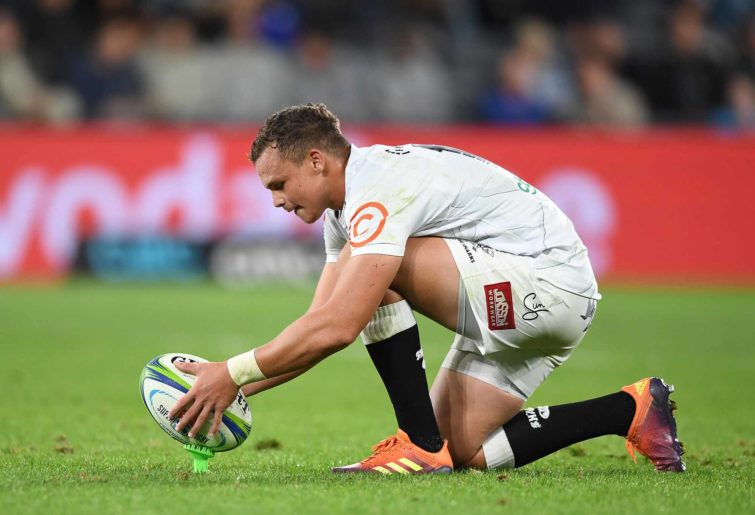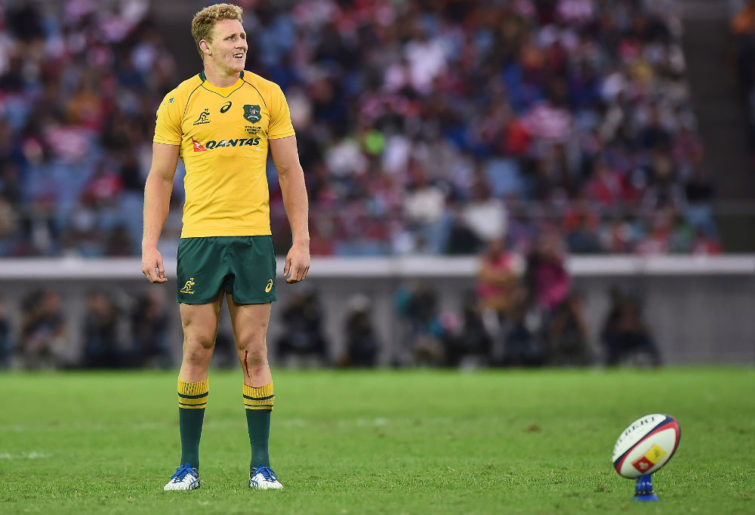Johnston, Foxx, Oates, To'o, Tupou, Coates: Who are the NRL's best 10 wingers for season 2023?
These 10 speedsters will be carving it up on the wings in 2023.
The Sharks’ momentous effort to score a draw against the defending champions, the Crusaders, in Christchurch was a goal-kicking lesson by young superstar Curwin Bosch.
Bosch, just twenty-one years of age, was born in Port Elizabeth and attended Grey High School.
Even in clips from his schoolboy days, it is evident that he had an amazing goal-kicking talent from a young age. And boy did he deliver on Friday night!
He scored all of the Sharks’ 21 points from his own boot and some of the kicks were close to fifty metres in distance. He is an immense talent and will be vying for a place in the Springboks’ World Cup squad.
The topic Friday night’s performance raised though was the old, somewhat conservative yet logical notion of taking the points when they are on offer. It is an idea often stereotypically associated with the northern hemisphere nations and South Africa.
Admittedly, up north, conditions are not always suitable to running rugby and therefore taking the three is a much safer option.

Curwin Bosch of the Sharks (AAP Image/Joel Carrett)
In South Africa’s case, playing at altitude means kicking almost becomes an attacking move employed by the Boks, as generally, their rival Super Rugby nations do not kick as far and as well.
In recent times, Super Rugby teams (including those from South Africa) have tended to rely on their attacking prowess to score points and frequently kick for touch rather than line up the three.
New Zealand’s superior attacking ability and ball skills though are why their Super Rugby sides and the All Blacks have dominated of late in either Super Rugby or the Rugby Championship.
What Bosch and the Sharks proved on Friday was that the accumulation of points through consistently taking the penalty kick at goal when possible still works. And it worked against the best side in the competition.
Now, of course, people will say that the Crusaders were missing players of the calibre of Richie Mo’unga and Mitchell Drummond but the truth is, the plan was successful.
Much credit must go to Bosch for having the skills and talent to execute the plan of taking all points when on offer.
The most credit though must go to the Sharks brain-trust who had the guts to go into the match with this game-plan.
Many commentators claim that you cannot beat the Crusaders by taking the three points and you have to go for the five-pointer. And while this may be true to a sense, the Crusaders only managed to salvage the match after the siren.
It is fair to say the Sharks effectively won, mentally and tactically, if not on the scoreboard.
So while it may have been successful for the Sharks, could such a strategy work for the Aussie Super Rugby sides and the Wallabies?
My gut feeling says no. Not at the moment. In terms of the kicking of the Australian flyhalfs this season, I don’t think they have the accuracy or distance (apart from Reece Hodge) to execute such a plan.
It is an idea that needs to be used by the Wallabies in the near future though because, as the Sharks showed, it has the ability to topple even the greatest of opponents.
One of the young hopes for the future of Wallaby flyhalf and goal-kicking positions is a player who was part of the Australian U20 side that won the Oceania U20’s Rugby Championship.
Will Harrison played at flyhalf for the Junior Wallabies in the tournament and scored twenty-eight points in two games from his own boot, twelve of those were penalty kicks against New Zealand in the final game of the competition.
In greasy conditions at Bond University on the Gold Coast, Harrison kicked the Junior Wallabies to a 12-0 lead at half-time. Of the four kicks, two of them were just under thirty metres on a slight angle, one from almost forty metres on the angle and the final one was an astonishing kick on the forty metre line, almost on the far touchline, which still cleared the crossbar by almost ten metres!
I am in no ways trying to suggest that Harrison should be included in the Wallabies squad, far from it. Instead, what his awesome kicking performance displays is that the ideology of taking the points when on offer is a notion that is certainly plausible and can beat the best of teams (in this case, U20 New Zealand).

Reece Hodge might not be the Wallabies’ best kicker but he is their longest kicker. (Photo by Matt Roberts/Getty Images)
The fact that the captain of the Junior Wallabies, Fraser McReight, had the confidence in both his kicker and his team to point to the posts each time is a sign that, under pressure, the next generation of Wallabies are not afraid to be slightly against the times and take the three.
For the U20s, the asset of having a quality kicker in the form of Harrison ultimately meant they consistently accumulated points while the Baby Blacks couldn’t break their own deadlock.
The fact that the U20’s have the game-plan and players to execute this strategy is an incredibly positive sign for the future of Australian rugby. And there is no reason why the current crop of Australian goal-kickers floating around Super Rugby can’t emulate that success.
If they can be confident and good enough kickers where they can be relied upon to take those bankable three points, or to have to try and knock one over from forty metres plus, it gives their side a huge advantage over their opponents.
The performance of the Sharks in Super Rugby, and the U20’s in the Oceania Championship, have shown a recipe that can effectively match and beat Australia’s Trans-Tasman rivals.
This does not mean that we give up on our attacking plays, if anything more creativity is needed in this department. What the Sharks and Junior Wallabies have presented is an opportunity that the Wallabies can exploit the New Zealanders at.
It will take time, patience and a slight attitude-shift. If the Australian Super Rugby sides and Wallabies can learn once again to have faith in their goal-kickers to provide a foundation for the team, they will hopefully find the key to a bolt much in need of being unlocked.